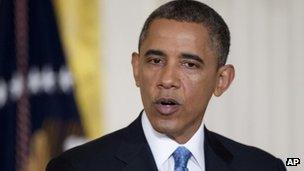Obama welcomes Republican plan to suspend debt limit
- Published

The White House has welcomed a Republican plan to suspend the US borrowing limit for almost four months.
The move "de-escalated the sense of conflict", said spokesman Jay Carney, a day after President Barack Obama was inaugurated for a second term.
A vote is expected to be held on the measure on Wednesday.
The Treasury has warned it will reach its $16.4tn (£10.3tn) debt limit in late February or March, and Congress must authorise it to borrow more money.
Correspondents say the plan still faces some opposition from Republicans who had hoped to use a vote on the government's borrowing limit to introduce negotiations with the White House on federal spending cuts.
The White House said President Obama would not block a short-term extension if it passed Congress, Mr Carney said.
In a statement, the White House said the Republican bill "lifts the immediate threat of default and indicates that congressional Republicans have backed off an insistence on holding the nation's economy hostage to extract drastic cuts" in social programmes.
But it said passing a short-term measure added "unnecessary complications" and "needlessly" perpetuated fiscal uncertainty.
The Republican proposal would suspend the current borrowing limit until 18 May, the House Ways and Means Committee said on Monday.
It would also withhold pay from members of Congress from 15 April until a budget is passed.
Republicans had previously threatened not to pass an increase in the debt limit unless it was paired with spending cuts.
But President Obama refused to negotiate, demanding that lawmakers pass an unconditional debt limit increase.
The current fight over the debt limit comes less than a month after Congress and the White House struck a last-minute deal to prevent the so-called fiscal cliff - a combination of sharp spending cuts and tax increases.
The last debt ceiling battle between Congress and Mr Obama ended in July 2011, after bringing the nation close to default on its debt and resulting in a credit rating downgrade as well as financial market turmoil.